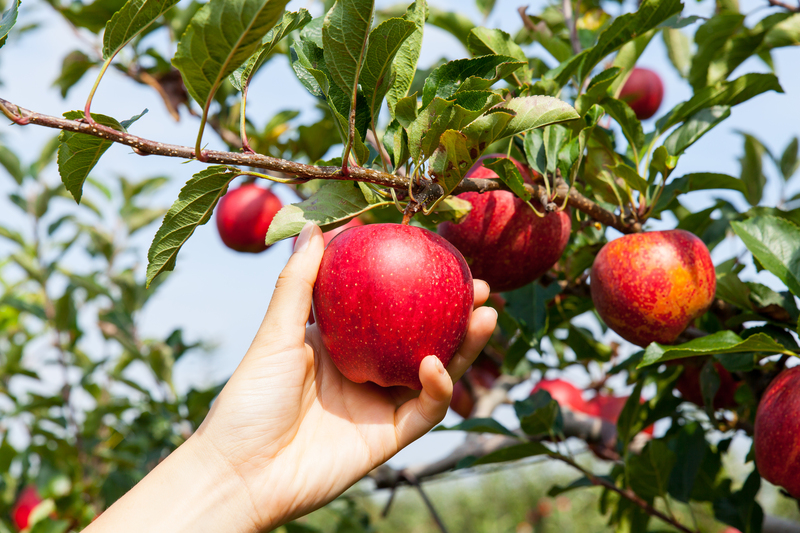Understanding Gardening's Impact on Global Climate Efforts
Posted on 02/09/2025
Understanding Gardening's Impact on Global Climate Efforts
Gardening is often seen as therapeutic, beautiful, and a way to grow fresh food, but its influence runs even deeper. In the context of worldwide environmental initiatives, the act of cultivating gardens--whether in urban backyards, community lots, or rural settings--can be a significant force in addressing climate change. This comprehensive article delves into the various ways gardening intertwines with global climate efforts and how every gardener, no matter the scale, becomes a critical participant in the fight against climate change.

The Basics: Global Climate Efforts Explained
The term global climate efforts refers to the myriad strategies, policies, and actions nations, communities, and individuals adopt to mitigate rising greenhouse gases, reduce ecological footprints, and slow planetary warming. Some of the most recognized initiatives include:
- The Paris Agreement, aiming to keep global warming below 2?C, ideally 1.5?C.
- National policies like the USA's Inflation Reduction Act and the EU's Green Deal.
- Community-level eco-projects, reforestation, and carbon offset programs.
- Encouraging individual choices--like renewable energy use, reduced meat consumption, and sustainable gardening.
These efforts hinge on collective and interconnected actions. While gardening may seem modest next to industries and governments, its cumulative effect can be surprisingly profound.
The Role of Gardening in Environmental Sustainability
Gardening stands at a unique crossroads of ecology, social well-being, and environmental responsibility. The processes involved in setting up and maintaining gardens can mesh seamlessly with broader climate initiatives. Here's how:
1. Carbon Sequestration: Trapping Carbon Dioxide in the Soil
One of soil's critical environmental services is its ability to store--or sequester--carbon. Healthy garden soils, enriched with compost and organic matter, draw in carbon dioxide from the atmosphere and lock it away. This carbon capture process slows greenhouse gas accumulation--a direct contributor to combating climate change.
- Trees, shrubs, and perennials in gardens all absorb CO2 as they grow.
- Practices like composting and mulching increase soil carbon content and fertility.
- Even small urban gardens, when multiplied thousands of times over, make a measurable difference.
2. Biodiversity: Gardens as Miniature Ecosystems
Healthy ecosystems support the planet's ability to regulate climate. Home gardens, rooftop plots, and community green spaces provide living quarters--known as microhabitats--for countless species. By cultivating diverse plantings, gardeners:
- Encourage pollinators, crucial for food security and natural plant reproduction.
- Support beneficial insects, birds, and other wildlife--enhancing genetic diversity.
- Maintain soil health, disease resistance, and natural pest control.
Biodiverse gardens are more resilient to climate stressors, such as drought and heat waves, and thus contribute to the adaptability of regional ecologies.
3. Reducing Food Miles: Fresher, Local Produce
The average meal travels thousands of kilometers from farm to plate, consuming fossil fuel and producing a sizable carbon footprint. Gardening for food shrinks or even eliminates the need for long-distance transportation:
- Vegetables, fruits, and herbs harvested just steps from your kitchen reduce greenhouse gas emissions associated with conventional agriculture and shipping.
- Gardens encourage seasonal and local diets, further lowering transport and storage emissions.
By participating in urban agriculture, individuals can collectively make a significant impact when it comes to climate-friendly food systems.
4. Reducing Chemical Dependency: The Organic Advantage
Commercial agriculture is a major emitter of greenhouse gases--in part due to the heavy use of chemical fertilizers and pesticides. Microscale, organic gardening practices have a far gentler footprint:
- Eliminating synthetic fertilizers reduces nitrous oxide emissions--a greenhouse gas far more potent than CO2.
- Composting kitchen and garden waste closes nutrient loops, enriching soil naturally.
- Integrated pest management fosters natural balance, reducing the need for chemical interventions.
Widespread adoption of these practices aligns with global climate goals, including the regeneration of agricultural soils and water conservation efforts.
Urban Gardening: Green Oases in Concrete Jungles
As cities grow, so does their share of total carbon emissions. Urban gardening--from community plots and school gardens to rooftop farms and living walls--offers a suite of climate solutions:
- Green roofs and walls sequester carbon, provide insulation, and lower urban temperatures.
- Pocket parks and tree planting mitigate urban heat islands and improve stormwater management.
- Urban gardens restore habitat for pollinators, reducing biodiversity loss.
When city dwellers embrace gardening for climate action, they also gain co-benefits:
- Improved air quality, with plants filtering pollutants.
- Stronger social bonds through cooperative gardening.
- Access to affordable, nutritious food in food deserts.
Green cities are more than aspirational--they are a proven pathway to meeting global climate targets.
Regenerative Gardening: Going Beyond Sustainability
The gardening movement is evolving from "do no harm" to "restore and enhance". Regenerative gardening aims not just to sustain, but to improve ecosystems, offering transformative solutions to the climate crisis:
- No-dig gardening preserves soil structure, leading to greater carbon retention and less erosion.
- Polyculture and rotational planting mimic natural systems, reducing pest risks and replenishing nutrients.
- Using native and drought-tolerant plants conserves water and boosts local resilience against extremes.
Regenerative gardeners also tend to embrace:
- Rainwater harvesting
- Biochar amendments
- Permaculture techniques
These advanced methods offer scalable models that link gardening directly to climate restoration.
Community Gardens: Small Plots, Big Impact
Community gardens are blossoming in cities and rural towns alike, integrating social justice, food security, and climate-conscious land use. Their impacts include:
- Democratizing access to green space
- Fostering environmental stewardship and education
- Unearthing climate solutions that resonate locally
Research has shown that community gardeners are more likely to:
- Lead sustainable lifestyles
- Purchase less packaged, resource-intensive foods
- Advocate for green policies
As hubs for learning and innovation, community gardens drive grassroots movements that scale up climate action.
Gardening and Water Resources: Another Climate Dimension
Climate change is causing more frequent droughts, floods, and unpredictable rainfall. Gardening practices can buffer these trends:
- Rain gardens and permeable surfaces reduce runoff and recharge aquifers.
- Mulching and shade planting minimize evaporation, stabilizing local water cycles.
- Utilizing water-wise and xeriscaping techniques conserves precious potable water.
By implementing smart water solutions, gardeners become stewards not only of carbon but also of vital water resources.
The Psychological Advantage: Cultivating Hope and Engagement
While not always measured in carbon credits, the mindset and hope inspired by gardening are essential to climate resilience. Becoming an active participant in the environment through gardening can lead to:
- Greater environmental literacy
- Personal investment in local and global climate goals
- Intergenerational knowledge transfer and collective action
Hope and empowerment fuel the societal will to implement and sustain broad climate action. In this sense, gardens grow not just plants, but committed climate advocates.
Barriers and Solutions: Making Climate-Friendly Gardening Accessible
Despite its benefits, not everyone has access to land, time, or knowledge for effective climate-smart gardening. To democratize the climate impacts of gardening, communities and policymakers can:
- Expand public gardening spaces and urban agriculture policies
- Support gardening education in schools and community centers
- Offer resources and incentives for sustainable practices, like compost distribution and rainwater barrel programs
- Utilize digital platforms to provide remote tutorials and mentor networks
By lifting the barriers to entry, society can amplify gardening's role in global environmental efforts.

How to Start: Practical Steps for the Climate-Conscious Gardener
Ready to garden for the planet? Whether you have a balcony or an acre, here are easy steps to ensure your gardening aligns with climate change mitigation:
- Compost food and yard waste to enrich soil and reduce landfill methane emissions.
- Choose diversified plantings, including natives, to support biodiversity and soil health.
- Practice water-wise gardening by mulching, capturing rainwater, and grouping plants by water needs.
- Avoid synthetic fertilizers and pesticides.
- Grow your own food--herbs and greens are easy for beginners.
- Advocate for and join local gardening or food initiatives.
Most importantly, share what you learn--each gardener can inspire dozens more, creating a ripple effect with global ramifications.
The Big Picture: From Yards to the World
It's easy to dismiss gardening as a hobby or a pastime, but the data and trends are clear: widespread, thoughtful cultivation of plants and soils offers real, scalable solutions to the climate crisis. From sequestering carbon to cooling urban spaces, promoting biodiversity, and reducing food miles, gardeners are vital contributors to global climate strategies.
Understanding gardening's impact on global climate efforts means recognizing that every garden--big or small--matters. And as more people take up the trowel, the world moves closer to a healthier, more sustainable, and climate-resilient future.
Find Out More & Take Action
- Connect with local garden clubs and environmental groups.
- Seek out resources from organizations like the Royal Horticultural Society or the American Community Gardening Association.
- Follow global climate news to understand how your garden's success fits into the bigger picture.
Your gardening journey is not just about you--it's about securing a livable planet for all. Start today, and grow hope for tomorrow.
Latest Posts
Affordable Green Retreats: 5 Low Maintenance Garden Tips
Step-by-Step Guide to Weatherproofing Your Garden
An Introduction to Container Gardening

